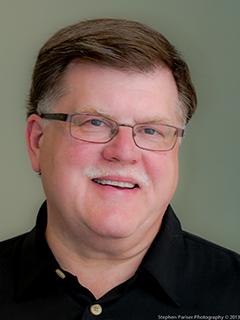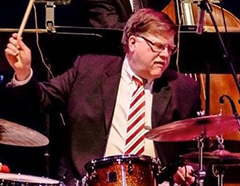by
Rhythm Scene Staff
| May 11, 2020
 Robert Breithaupt has distinguished himself over 50 years as having one of the most diverse careers in the percussion business, as a performer, educator, author, arts administrator, musical contractor, clinician, and consultant. He has performed with dozens of jazz artists and with over 100 symphony orchestras in the United States and beyond. Breithaupt is Professor of Music at Capital University in Columbus, Ohio, President of RBMusic, Inc., and has formerly served as Executive Director of the Jazz Arts Group of Columbus, President of PAS, Vice-President of the Jazz Education Network, and was co-founder of Columbus Pro Percussion.
Robert Breithaupt has distinguished himself over 50 years as having one of the most diverse careers in the percussion business, as a performer, educator, author, arts administrator, musical contractor, clinician, and consultant. He has performed with dozens of jazz artists and with over 100 symphony orchestras in the United States and beyond. Breithaupt is Professor of Music at Capital University in Columbus, Ohio, President of RBMusic, Inc., and has formerly served as Executive Director of the Jazz Arts Group of Columbus, President of PAS, Vice-President of the Jazz Education Network, and was co-founder of Columbus Pro Percussion.
Rhythm! Scene: How did you get started in percussion?
Robert Breithaupt:Actually, I did not begin as a drummer, but the instrument sort of “found” me along the way. I was first attracted to the trombone (you saw the trombone quite a lot on television in the early 1960s), and then played the violin briefly when I was about 10 years old, mostly just to become involved in music in the public schools. I began playing snare drum in a traditional band setting when I was about 10, but almost immediately found myself attracted to and obsessed by the instrument. I played along with every recording I could find, even when I had nothing more than a practice pad.
R!S: What was one of your most memorable performances as a student percussionist?
RB: I had some very cool experiences as a young drummer performing professionally with older players, but as a percussionist, probably it was performing with a select high school orchestra in Pittsburgh at the Mideast Regional music conference. Great repertoire for a young percussionist/timpanist—"Overture to Candide,” “New World Symphony,” etc.Had I taken another path, I may have ended up as an orchestral timpanist, because I loved that so much.
 R!S: Who were key or memorable teachers in your musical education?
R!S: Who were key or memorable teachers in your musical education?
RB: We all have numerous influences that we can name, but for me I can begin with a few from my earliest days. There was a great teacher in Columbus named Charlie Brown, who had been a Wilcoxin student and who was a taskmaster with my hands early on. I had a timpani teacher, Dr. Darrell Wood, who was actually a French horn player, who was very helpful to me as he pressed me on sound and intonation and told me in my first lesson that I was already a much better drummer than he, but we were going to work on music. That was a shock, but made an indelible impression. I had a great teacher in college named Wendell Jones, who was also a real mentor to me and had been a working musician and in the retail business before he ever got into collegiate teaching. In those days, most of us were studying with “first generation” percussion instructors. I took a couple of lessons with Joe Morello at the old Ludwig Symposiums, but got some terrific guidance from the legendary Cleveland instructor and player Bob McKee, who also taught guys like Skip Hadden, Jim Rupp, Val Kent, and many others in the region.
R!S: Who was your percussion idol growing up?
RB: Unlike many players my age who speak of having an epiphany when they first saw the Beatles on the Ed Sullivan show (I still remember that very vividly), I was drawn to players such as Joe Morello and others, probably due to the fact that my parents and grandparents were music fans. In the case of Joe, he was the epitome of musicianship, technique, and grace behind the drums. Certainly, players like Mitch Mitchell [Jimi Hendrix Experience], Bobby Colomby [Blood, Sweat & Tears], and of course Buddy Rich were influential, but Joe was number one. My grandparents lived with us, and I spent a lot of time at their business, and there was jazz and “easy listening” music on all the time, so my ears were conditioned to not only what I was hearing on the radio and playing, but also by what my family listened to.
R!S: What is your favorite percussion instrument and why?
RB: I suppose that the drum set would be my favorite due to the fact that it is where I began and where I spend most of my time today, and probably what I’m most noted for as a performer.
R!S: What sort of music activities are part of your job—performing, teaching, composing, recording, engineering, other?
RB: I’m in my 42nd year as Professor of Percussion at Capital University, where I am one of three percussion instructors. I am most proud of this, as we have some truly outstanding alumni in every facet of the business, and I am so pleased that I have kept a close bond with many of my students. I have been performing with the Columbus Jazz Orchestra since 1980, and have developed a niche as an active orchestral drum set player. I actually enjoy doing this sort of playing and touring, and find the prospect of trying to get an orchestra to “swing” is a worthwhile challenge. I have written articles, chapters, and books, and produced various video resources. As an administrator, I’ve been a department chair and also an executive director, serving 11 years at the helm of the Jazz Arts Group of Columbus, where I functioned in the same role as the ED of an orchestra or opera company, with a full staff. I have a musical contracting firm, RBMusic, where I hire for Broadway shows and other one-off orchestra and show dates. I do some arts consulting on occasion, and I’m still on the board of the Jazz Education Network (JEN). In my past life I was President of PAS, Vice-President of JEN, and Vice-President of Columbus Percussion.
R!S: What was your introduction to PAS?
RB: I can’t remember exactly when I joined, but I am sure it was early in my high school years, around 1970 or ’71. I was always looking to find reading material that I could slip inside a book in class, like I did with the famous 1966 Ludwig catalog, so anything I could read about drums and percussion, I was going to obtain and pay more attention to that than anything else at the time.
R!S: What is one thing you wish all student percussionists knew about PAS?
RB: I wish that young folks would look to the resources of the PAS archives either first or certainly in conjunction with a random Google search. In some ways, cursory knowledge is too easy to obtain these days. Digging for information opens up other paths you never knew existed.
R!S: What's the first section you read in a new issue of Percussive Notes or Rhythm! Scene?
RB: Probably the reviews.
R!S: What is your most prized percussion-related souvenir?
RB: I have a personal note of thanks from Terry Gibbs after having played a series of concerts and shows with him. It was very specific in his compliments, and it is on his personal stationary. While we have worked together since and, fortunately, he is still kicking and on Facebook, getting something like this was very gratifying to me. Performing his “Dream Band” book with Terry in front while I was taking the “role” of Mel Lewis was like playing Beethoven with George Szell conducting.
R!S: If you aren't playing or teaching percussion, what are you doing?
RB: I am fortunate to live on a very picturesque piece of property that backs up to a reserve, so simply listening to music, reading, or doing other sorts of work and staring outside is very therapeutic. I’m also a hockey and soccer fan, so having season tickets to our NHL and MLS teams also occupies time, and I find it to be a valuable diversion and a wonderful way to connect with my family.
R!S: What music or station is playing when you turn on your car?
RB: Probably the Sirius jazz station or NHL Network. I have to be honest on that question.
R!S: What's the first app you open on your phone or first program you start on your computer each morning?
RB: Given the world’s situation, it would be CNN. Having a sense of the world order is beneficial in many ways. It’s easy to check out, but you will ultimately pay a price for a lack of awareness.
R!S: If you could tell your 18-year-old self one piece of musical advice, what would it be?
RB: Use every minute you can to develop your craft, as you’ll never have any more time at your disposal to develop your skills, especially on piano.